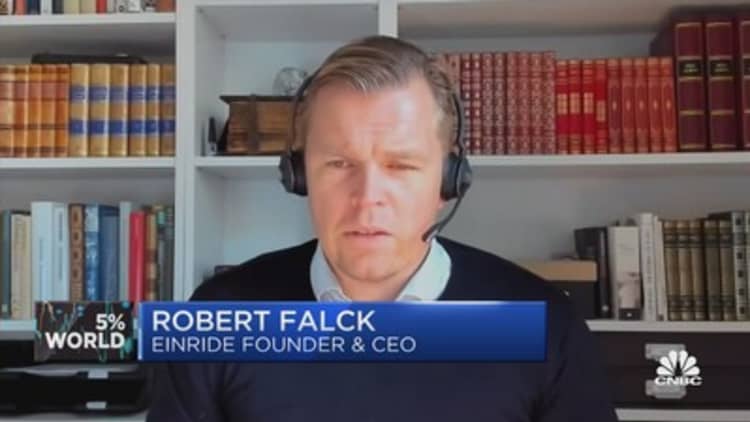
The Einride electric truck charging station, built by Voltera, is located in Lynwood, California, near the Ports of Los Angeles and Long Beach.
final drive
One of the first freight truck-scale electric vehicle charging stations is opening near the major ports of Los Angeles and Long Beach, California, as the trucking market takes some limited but important steps to build the infrastructure needed for the long-term transition. Electric trucking and net-zero transportation.
The Lynwood Smart Charging Station along Interstate 710, built by Sweden-based trucking company Einride and electric vehicle charging infrastructure company Voltera, has 65 chargers capable of charging 200 vehicles per day and was originally built for the global shipping giant Services are provided on routes operated by AP Moller-Maersk. It is also a venture investor in Einride, which was named to the 2023 CNBC Disruptor 50 list.
The Ports of Los Angeles and Long Beach handle 29% of all ocean container traffic entering the United States
Robert Falck, CEO and founder of Einride, said in a statement: “The launch of Einride’s first smart charging station in the United States marks an important step in digitizing electric freight and becoming an important driving force in increasing the resiliency of the U.S. freight system.”
Founded in 2016, Einride operates one of the largest fleets of heavy-duty electric trucks for major companies such as PepsiCo.
Voltera, which develops, owns and operates electric vehicle infrastructure, said the site was licensed, built, electrified and operational within 18 months. “In the world of charging infrastructure, this is pretty remarkable,” CEO Matt Horton said in a statement.
Einride plans to open many EV charging stations on the West and East Coast for freight trucking, although California is currently the only state with large-scale EV freight charging stations.In addition to the new Lynwood station, logistics companies NFI announces launch of cargo electric vehicle charging station In February, it can accommodate up to 50 trucks, including trucks from Volvo In partnership with Electrify America and Southern California Edison. The NFI Port Haul Truck EV Charging Station is located at its warehouse facility in Ontario, California, and is strategically located to serve Southern California’s major ports.

Since electric truck batteries have limited range, trucking companies and EV partners are focusing on short hauls and short-distance cargo transportation for use in ports and intermodal logistics facilities.
Erik Neandross, chief executive of transport consultancy GNA, which works with clients on low-carbon and zero-emission freight operations, said servicing 50 or more trucks is on par with what the freight market has done so far. The scale of the work is different, but he added that development of large-scale charging of electric trucks is still in its early stages. “We’re very early. It’s fair to say we’re in the top half of the first inning. California is really the epicenter of an event of this magnitude and magnitude,” he said.
California has been active in providing grants and incentives to build electric vehicle infrastructure, approving $750 million in development by its utilities, which is significant in a market where there are still few electric trucks or charging stations on the road. .operation, making it difficult to demonstrate cost competitiveness relative to diesel.
Government and utility spending, coupled with regulations to achieve net-zero emissions by 2040 and the need for major shippers such as consumer goods companies and major retailers (from PepsiCo to Walmart) to meet their own carbon emissions targets, have created an environment where Allowing more people to invest in the entire U.S. freight market will happen.
this California Air Resources Board Truck manufacturers are required to begin phasing in available heavy-duty electric vehicle technology this year, with the goal of achieving an all-zero-emission short-haul fleet by 2035. Medium- and heavy-duty trucks account for only about 4% of the U.S. vehicle fleet, but according to the Department of Energy, they consume more than 25% of total highway fuel and account for nearly 30% of highway carbon emissions.
More electric vehicle charging projects are planned for ports in New York and New Jersey and the Pacific Northwest.
“Now is the time to test it before the next few fleet buying cycles,” Niandros said. “There’s nothing like building infrastructure to get us out and see and learn. That’s where we are today.”
The entire supply chain, from product manufacturing to the containers shipped all the way from Shanghai to Chicago, requires a complex net-zero equation, with shippers and trucking companies targeting everything from energy use in factories to raw materials, packaging and more. and logistics. “To achieve net-zero emissions, you have to do all of this,” Niandros said. “Many of the companies we work with are working hard in non-transportation areas. PepsiCo, for example, has gone to great lengths to install LED lights, purchase renewable energy and maximize production efficiency. Now it’s time to start working on trucks and logistics It’s done. It’s hard, but it has to be done.”
The EPA this week issued new emissions directives for cars and pickup trucks, and the EPA is expected to soon issue new emissions requirements for medium- and heavy-duty trucks that will make diesel engine alternatives, including compressed natural gas, more competitive -Power trucks and zero-emission electric trucks.







